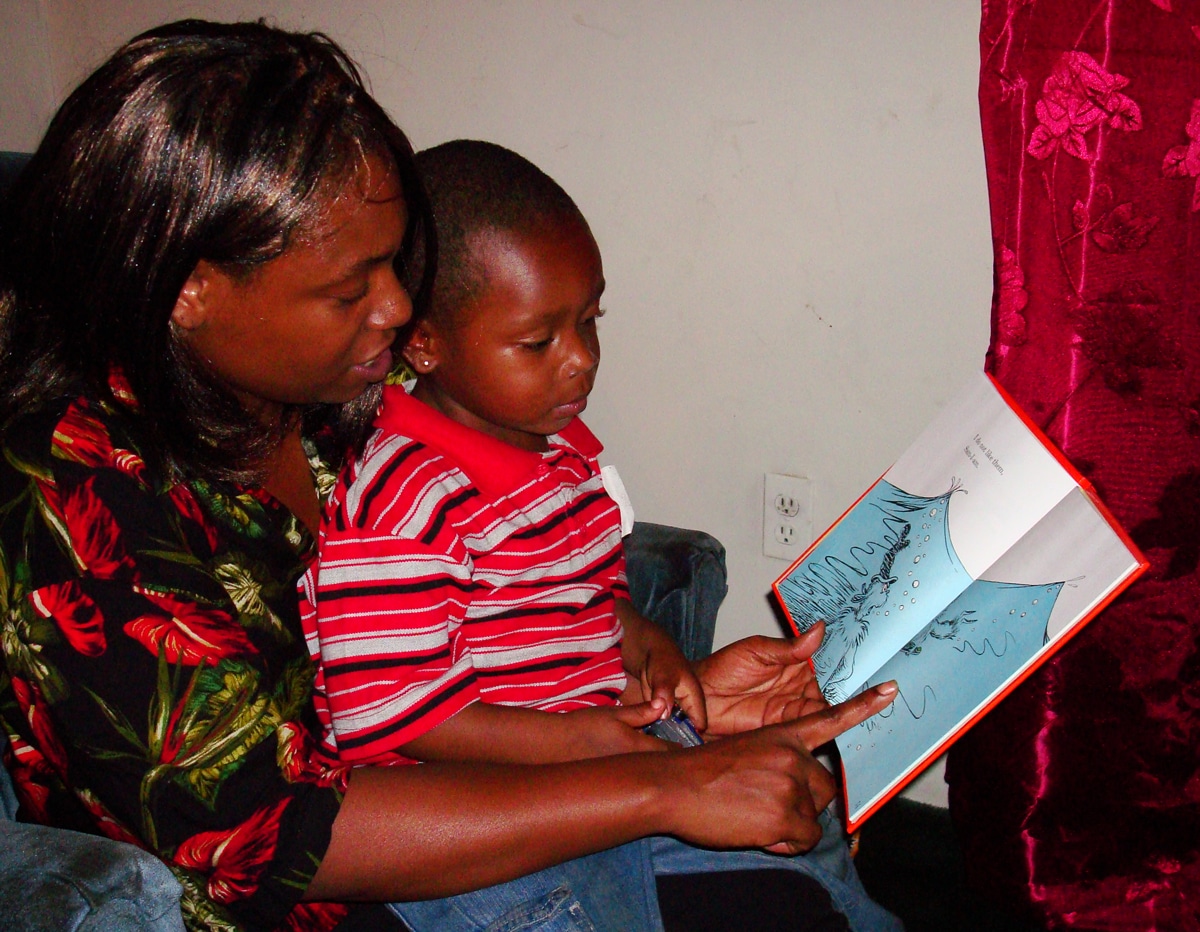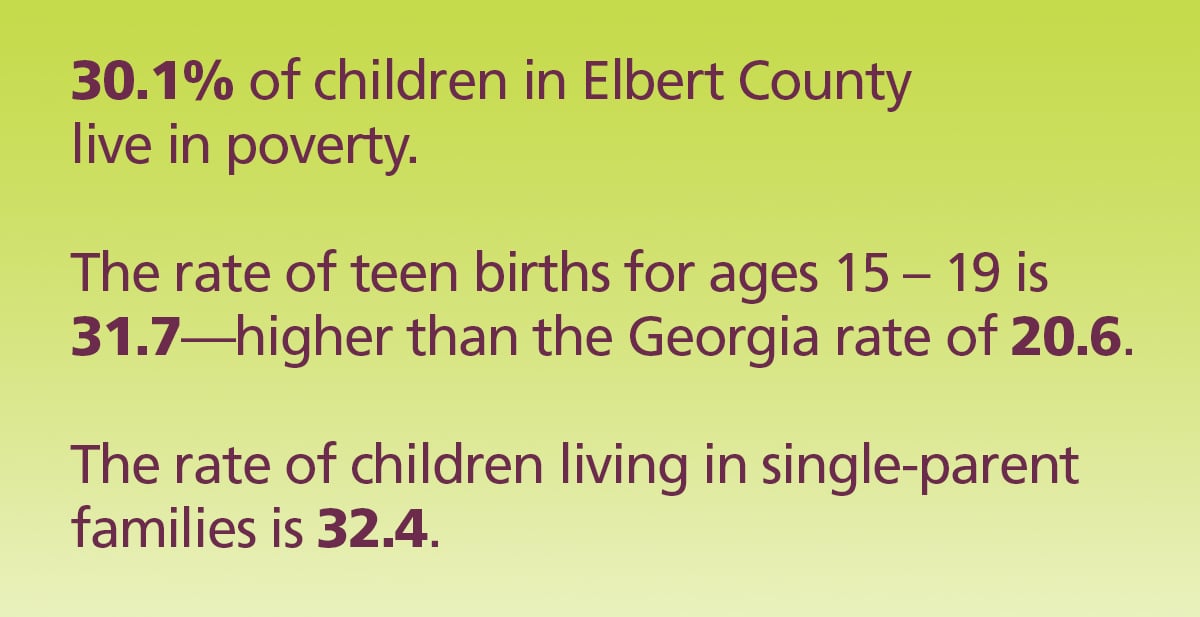Home Visitation Program Provides Valuable Support to Elbert County Families
Print This Post
by Diana St. Lifer
Understanding that her prematurely born son, Carter, may not engage in the same activities as other babies his age put Macie McCannon’s mind at ease. It’s one less worry for the 16-year-old mother who, with the help of Family Support Specialist Kathy Lee, is strengthening her parenting skills and knowledge through the Elbert County home visitation program.
Approximately 50 families participate each year in the program that utilizes the internationally recognized Parents as Teachers model to deliver parent education in families’ homes. The program serves families from pregnancy throughout the child’s first five years.
In-home visits take place an average of twice a month and the majority of families served include parents who are teens, single, living in poverty, have multiple children under age 5, or have a history of mental illness. According to Georgia KIDS COUNT data:

Referrals come from the health department, school system, and by word of mouth from families in the program. Elbert County’s two-family support specialists—also referred to as parent educators—made more than 720 home visits last year.
Laura Evans, executive director of Community Partnership of Elbert County, said the evidence-based home visiting model is developmentally based, which is vital in determining that each child is on track to enter school ready to learn. Evaluation begins as young as four months old, using an Ages and Stages Questionnaire screening tool.
If a developmental delay is detected, the child is referred to Babies Can’t Wait, which provides diagnostic assessment. “The earlier we can identify a delay, the earlier the child can get services and the more likely it won’t be a problem down the road,” said Evans. A comprehensive life skills progression assessment examines the family dynamics and relationships, and the parent educators help families set goals.
According to Parents as Teachers, more than a dozen outcome studies have been conducted on the home visiting model. In addition to the early detection of developmental delays and health problems, evaluation results show that children enter kindergarten ready to learn and achieve school success into the elementary grades; parents improve their parenting knowledge and skills, and are more involved in their child’s schooling; and families are more likely to promote children’s language and literacy.

Evans, Lee, and Family Support Specialist Kathy Franklin have been with the program since its inception in Elbert County in 2000, when Community Partnership of Elbert County launched its Early Childhood Health Education initiative. The trio is the backbone to the program’s success.
“We’re fortunate that the staff has remained consistent,” Evans said. “Our family support specialists visit homes on a regular basis and they do a great job building relationships and trust.”
Lee met McCannon when she was pregnant with Carter, who came into the world six weeks early. “It was difficult for her, her boyfriend, and their families to go through the first six weeks worrying, because Carter had some difficulties,” said Lee, who was there to explain the developmental delays a premature baby faces.
“Ms. Lee helped me understand that Carter is two months behind other babies his age,” McCannon said. “If I ever need anything or have questions I can ask her and she will help. There’s so much I wouldn’t have known if it weren’t for being in this program.”
“Macie is a loving, attentive, and nurturing mother,” said Lee, who is pleased with McCannon’s progress. “I enjoy watching her grow as a mom and a young lady. It’s exciting to share information from Parents as Teachers so she can know what to expect as Carter grows from a baby to a toddler and beyond.”

One of the family goals was for McCannon to get her driver’s license—which she’s done, and another is for her to graduate high school—and she’s on track to do that.
“I feel God led me to this job,” said Lee. “It’s an opportunity to work with parents in our community and to teach them good practices at parenting and activities to promote their child’s brain development. The first three years is so important in laying down a solid foundation in children’s brains that will benefit them the rest of their lives.”
Parents can attend monthly meetings, hear guest speakers, and become connected to valuable community resources. Last year Parents as Teachers awarded Elbert County Blue Ribbon Status for Quality Endorsement. Affiliates must meet 75 out of 100 criteria to be eligible, and Elbert met 92.
Success, however, does not come without obstacles. Keeping families engaged and enrolled is a challenge. “Families move or become busy with work or school and can’t find the time,” Evans explained. “They don’t drop out because they don’t like the program or home educators, but families do disappear on us.” The retention rate for 2016-17 was 84%, excluding families who moved away from the area.
Primary funding for the home visitation program comes from Promoting Safe and Stable Families, a federal grant given to the state through the Division of Family and Children Services. The program must apply for funding each year and provide a 25% match. This year’s total program budget is $89,541.
“All the families we’ve ever served love their children and want the best for them. But things get in the way that can sometimes make it hard for them,” Evans said. “Everyone has things they’re good at and things they need to work on. We could all use feedback from others to strengthen the things we’re doing well and receive help in areas where we need improvement.”
Learn more about the Parents as Teachers model.
